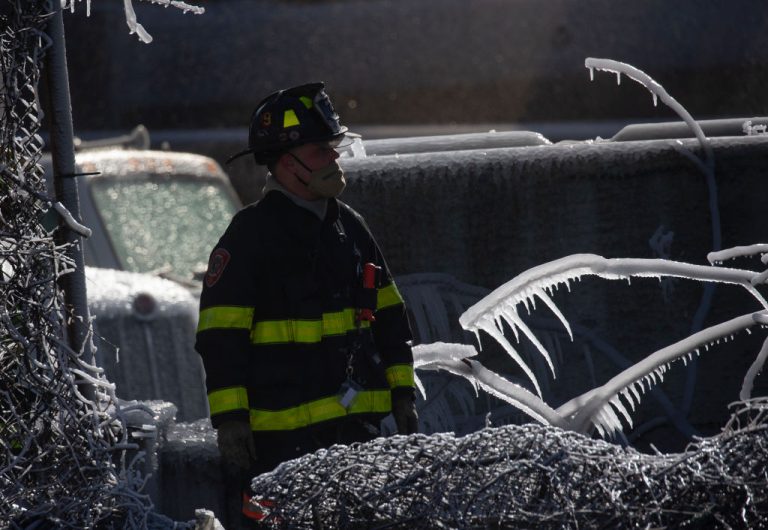A curious string of fires and plane crashes over the last month have destroyed the facilities of at least five major food processors across four different states, exacerbating an escalating inflation and supply chain crisis that is quickly becoming chronic.
The most recent instance appears to be the destruction of Oregon-based Azure Standard’s joint headquarters and warehouse facilities during the night of April 18.
Azure Standard Headquarters
In the text of an email alerting affiliates to the damage, the company describes itself as “the USA’s largest independent food distributor.”
It notes that “basically any…liquid product,” such as honey, oil, and vinegar, will be out of stock as a result of the damage.
Azure Standard also states it lost its fruit packing and carob product facility in the blaze, but expects limited effect as a result of the fruit harvesting season not yet being in swing.
EMERGING SOCIETAL CRISIS:
- Virtual Reality an ‘Effective Tool’ To Force Consumer Behavior Change: Study
- The World’s Top Producer of the World’s Most Used Vegetable Oil Is About to Ban Exports
- Fires Hit Russian Research Center, Country’s Largest Chemical Plant on the Same Day
Success
You are now signed up for our newsletter
Success
Check your email to complete sign up
The blaze appears to have received almost zero media attention, only being covered in a terse rewrite of the press release by small town media outlet Columbia Gorge News and the Columbia Community Connection News (CCC) blog.
CCC reported that records from the local county Sheriff’s log stated “Lights flickered; They heard a pop and went up there to check it out and there was a fire.” By the time fire responders arrived, with only one truck and four men, there was already a hole in the roof with flames bursting forth.
It took approximately 45 minutes for reinforcement units to arrive.
According to the outlet, company CEO David Steltzer was on the scene when the fire occurred.
Additionally, Fire Chief Jon Keyser Jr. was paraphrased as stating that “Steltzer was removing paperwork from the building” when his initial crew arrived on scene.
Keyser was further paraphrased as stating the building was “loaded with fuels including vegetable and nut oils made from canola, coconut and olives,” which made the fire difficult to handle with water as foam-based products are required to smother the flames.
Taylor Farms
On April 13, a major food California processing plant belonging to Taylor Farms burned almost completely to the ground. USA Today affiliate The Californian quoted Deputy Fire Chief Sam Klemek as saying, “About 85% to 95% of the building is a total loss.”
The article states the facility employed almost 1,000 people.
“There are parts of the building that are separate, that are still operational. As far as the main processing facility, it’s considered a total loss,” added Klemek.
The blaze was especially significant as local residents fell under a shelter-in-place order resulting from the risk of 35,000 pounds of anhydrous ammonia held on site, which although fortunately avoided catching fire and exploding disastrously, nonetheless suffered a “moderate leak” that “has been secured on site,” said Klemek.
RELATED READING:
- Russia Admits Heavy Pressure Under Sanctions, But Says Its Economy Far From Collapse
- US Rail Carriers Are Cutting Fertilizer, Grain, Coal Shipments
- CP Rail Blaming Union for Work Stoppage Threatening Canadian Farm Output
- More Bad News for Consumers: Visa and Mastercard Will Hike Merchant Fees In April
An update on the company’s website described the Salinas facility as its primary production facility.
Taylor Farms is a major player in the food supply chain for both Canada and the United States. According to a company press release, the firm was recognized by Walmart as its 2022 Food Supplier of the Year in March.
Although the company is a private firm and does not publicly disclose financial reports for shareholders, websites such as Zippia and Zoominfo estimate annual revenues at between $2 and $3 billion.
Industry outlet Western Farm Press described the facility as one that “manufactures wholesale products like bulk salads and shredded lettuce used by restaurants and schools,” adding the company expected to rebuild and be operational again as early as spring of 2023.
Gem State Processing
The same day as the Taylor Farm fire, an airplane crashed into Idaho’s Gem State Processing plant. A release by the local police department said that while the pilot did not survive, no employees were injured.
April 18 reporting by Daily Mail identified the pilot as a 30-year-old woman with 11 years of flight experience who was transporting UPS packages from Salt Lake City.
The woman’s “distraught” father attributed the cause of the crash to a 60-foot chimney on the roof of the plant that allegedly disburses a large amount of steam.
Local authorities were paraphrased as stating the woman “was flying too low while attempting to land.”
The website for the company describes itself as processing 18,000 acres worth of potatoes each year.
The facility appears to have been largely undamaged in the incident.
Maricopa Food Pantry
On March 28, Maricopa Food Pantry, a local food bank in Arizona, lost 50,000 pounds worth of food in a fire that occurred “just 15 minutes after their food bank closed,” according to CBS affiliate Arizona’s Family.
Company President Mike Connelly described the blaze as one “40-50 feet in the air, just pure black smoke,” that “engulfed the entire neighborhood.”
The article at the time stated the cause of the fire was unknown, but paraphrased Connelly as positing “trailers with more than a hundred gallons of diesel fuel to refrigerate food made it much worse.”
AZCentral cited CEO Jim Shoaf in stating that 15,000 pounds of meat and 40,000 pounds of canned goods and “other commodities” were lost in the blaze.
April 20 reporting by ABC15 said that Phoenix-based St. Mary’s Food Bank had replenished the three trailers and 50,000 pounds of food lost with inventory from its own supply.
Shearer’s Foods
On March 22, Tri-City Herald reported that the Shearer’s Foods potato chip plant in Hermiston, Oregon was “gone” after a boiler explosion and its subsequent fire annihilated the facility.
The outlet reported that the boiler was fueled by natural gas and that the company supplied potato and corn chips throughout the western United States.
Seven employees were hospitalized in the blast. The Herald stated the facility is home to nearly 400 employees.
The webpage for a local lawyer commencing legal proceedings against the company on behalf of two of the injured staffers alleged the boiler “was an inherently dangerous defective product apparently owned by a third party.”
The firm further alleges that the boiler was utilized to power fryers for kettle chips and that it “was installed in a hallway rather than in an enclosed boiler room.”
It added that the company “manufactures Shearer, Kettle, Frito-Lay, Delicious and Vista branded snack foods, as well as for several private label brands including Walmart and Costco” and brings in estimated revenues in the range of $500 million per year.
Far from isolated incidents
There are also several additional instances of similar calamities in recent weeks.
On March 31 Texas-based Rio Fresh suffered a fire that severely damaged an onion processing facility.
Local media outlet KRGV reported the site employed 300 people and that “hundreds of thousands of warehouse space and structure was damaged from the fire.”
One staff member was quoted as stating, “If I had to guess, anywhere from 50 to 100 hundred truckloads of onions were lost in the fire, you can see them still burning in the distance.”
On March 16, a massive fire wiped out much of a Walmart fulfillment center in Plainfield Indiana, an event serious enough that it brought in the ATF to investigate.
For New Hampshire’s East Conway Beef and Pork, disaster struck on April 11 when a fire broke out serious enough that it took respondents 16 hours to extinguish.
Local news outlets, however, described the company as merely a local butcher shop.
Two cows were lost in the disaster.







